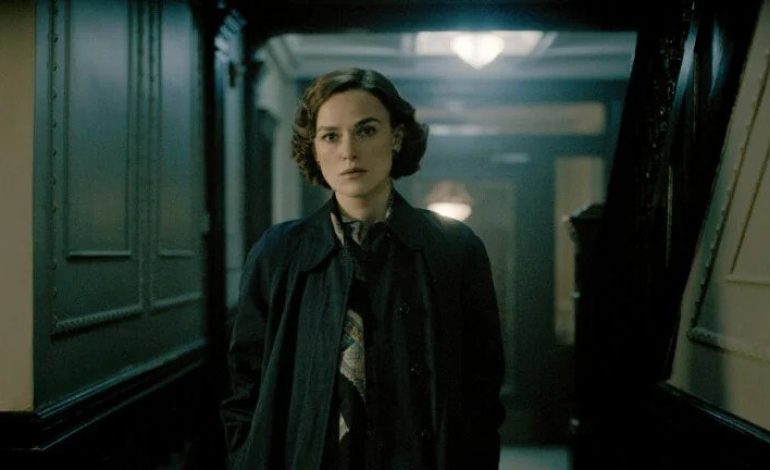

Stop the presses! Do you love a good film about journalists? Then look no further! Matt Ruskin’s Boston Strangler has a terrific cast that will bring you back to the 60s to uncover one of the most infamous sets of murders in the United States.
The film follows the story of a reporter for the Boston Record-American (later merged with the Boston Herald), Loretta McLaughlin (Keira Knightley). McLaughlin is eager to demonstrate her reporting abilities, but her snarky editor (Chris Cooper) keeps her on the lifestyle beat writing reviews on toasters.
Despite sexist opposition at the workplace and even from Boston police, McLaughlin and colleague Jean Cole (Carrie Coon) begin to uncover links between a handful of serial murders in Boston and the nearby areas. All the victims seem to be older women, all of whom have been sexually assaulted, and everyone has been strangled.
Knightley is flawless in the role of McLaughlin, conveying her tenacity with a single steely glance. She confronts the difficulties of being a woman at a newspaper in the 1960s, trying to dispel hesitations about her reporting sown by enraged Boston Police Department officials. McLaughlin and Cole keep the public informed and then become media sensations in their own right with the support of an accommodating detective (Alessandro Nivola).
Boston Strangler, shot in Boston and surrounding towns, captures the aesthetic and atmosphere of the city in the 1960s, right down to the period costumes. Director Matt Ruskin uses monotoned colors to capture the public’s unease and fear at the time.
Ruskin even avoids the pitfalls of modern true crime stories, which either tend to oversimplify source material or rely heavily on gruesome reenactments. Boston Strangler never reveals the titular killer (or killers) in the spotlight, and the rare murder reenactment never actively engages in graphic violence like some true-crime films. The main focus revolves around the journalists attempting to solve the case, like David Fincher’s Zodiac, to which Boston Strangler owes a debt of gratitude.
If Boston Strangler has one flaw, it focuses too much on the case details and fails to develop the characters’ relationships properly. McLaughlin and Coon are given a few scenes to share their pain about balancing family life while continuing to try and pursue the story. Still, McLaughlin’s chemistry with the editor and the detective feels a little forced.
Ruskin’s lack of bonding is most likely deliberate, mirroring how McLaughlin’s long-term obsession with the murders significantly affected her personal life. Nonetheless, the film could have benefited from more focus on the interpersonal.
After watching Boston Strangler, it’s easy to see why McLaughlin or anyone else would become enthralled in the Strangler saga. The film does not accept the official narrative that Albert DeSalvo (David Dastmalchian) was the primary perpetrator of the murders. Instead, it introduces audiences to the unknown with the case of other characters surrounding the murders.
Knightley creates a sympathetic character in her portrayal of McLaughlin, and her fascination becomes ours. Coon, on the other hand, is all harsh shouting and challenging reporting. Boston Strangler even has a few genuinely terrifying moments reminiscent of David Fincher’s Zodiac, which is why this one appears to take more than just a few cues. Instead of deviating from the newspaper thriller formula established by films like All the President’s Men, Ruskin paints by numbers. Even though the film’s final moments are worth discussing, this is a letdown. Regardless, one has to seriously question why Ruskin’s film was released on Hulu rather than in a theater near you, especially given its brilliant cinematography by Ozark’s Ben Kutchins.
Some scenes resemble classical art, but unfortunately, they can’t save a mediocre film. Still, it’s entertaining to see McLaughlin and Cole take on the cops courageously, and it’s entertaining to see Knightley run around being bold and strong and not taking “no” for an answer. See, journalists can be cool.
Score: 3 out of 5
Ruskin’s screenplay and stylistic choices may appear extremely familiar at times, but the storytelling and performances are so compelling that only traditionalists will dismiss the outcome. Furthermore, the commonalities between this particular case and the Zodiac killer might expose general patterns and institutional troubles among police units that they could not overcome at the time due to tradition and possibly foolish pride.
Whether interpreted as a serial killer movie or an inspiring story about females overcoming sexist attitudes, the film stays true to its predecessors while delivering an ongoing drama that will appeal to today’s amateur sleuths and true crime fans.
